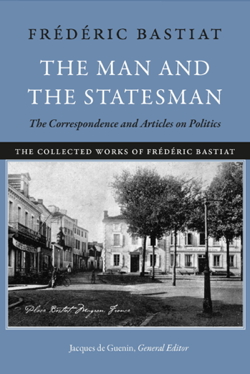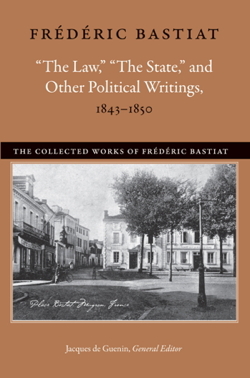
Resources on FrÉdÉric Bastiat (1801-1850)
<davidmhart.com/liberty/Bastiat>
[Updated: 18 January, 2017]
Dr. David M. Hart, Liberty Fund, Inc.
Work: <dhart@libertyfund.org> <oll.libertyfund.org>
Personal: <dmhart@mac.com>
<www.davidmhart.com/liberty>
 |
Claude Frédéric Bastiat (1801-1850) |
My dear Frédéric [FB writing to himself],
Like you I love all forms of freedom; and among these, the one that is the most universally useful to mankind, the one you enjoy at each moment of the day and in all of life’s circumstances, is the freedom to work and to trade. I know that making things one’s own is the fulcrum of society and even of human life. I know that trade is intrinsic to property and that to restrict the one is to shake the foundations of the other. I approve of your devoting yourself to the defense of this freedom whose triumph will inevitably usher in the reign of international justice and consequently the extinction of hatred, prejudices between one people and another, and the wars that come in their wake...
I love freedom of trade as much as you do. But is all human progress encapsulated in that freedom? In the past, your heart beat for the freeing of thought and speech which were still bound by their university shackles and the laws against free association. You enthusiastically supported parliamentary reform and the radical division of that sovereignty, which delegates and controls, from the executive power in all its branches. All forms of freedom go together. All ideas form a systematic and harmonious whole, and there is not a single one whose proof does not serve to demonstrate the truth of the others. But you act like a mechanic who makes a virtue of explaining an isolated part of a machine in the smallest detail, not forgetting anything. The temptation is strong to cry out to him, “Show me the other parts; make them work together; each of them explains the others. . . .” [Draft Preface for the Harmonies (1847)]
About Frédéric Bastiat (1801-1850)
Frédéric Bastiat was a pivotal figure in French classical liberalism in the mid-19th century. He suddenly emerged from the south west province of Les Landes to assume leadership of the fledgling French free trade movement in 1844 which he modelled on that of Richard Cobden’s Anti-Corn Law League in England. Bastiat then turned to a brilliant career as an economic journalist, debunking the myths and misconceptions people held on protectionism in particular and government intervention in general, which he called “sophisms” or “fallacies”. When revolution broke out in February 1848 Bastiat was elected twice to the Chamber of Deputies where he served on the powerful Finance Committee where he struggled to bring government expenditure under control. He confounded his political opponents on the left and the right with his consistent libertarianism: on the one hand he denounced the socialists for their economic policies, but took to the streets to prevent the military from shooting them during the riots which broke out in June 1848. In the meantime he was suffering from a debilitating throat condition which severely weakened him and led to his early death on Christmas Eve in 1850. Knowing he was dying, Bastiat attempted to complete his magnum opus on economic theory, his Economic Harmonies. In this work he showed the very great depth of his economic thinking and made advances which heralded the Austrian school of economics which emerged later in the century. Bastiat to the end was an indefatigable foe of political privilege, unaccountable monarchical power, the newly emergent socialist movement, and above all, the vested interests who benefited from economic protectionism. He was a giant of 19th century classical liberalism.
To find out more about Bastiat begin with these:
- "Introduction to the Life and Work of Frédéric Bastiat (1801-1850)" [HTML]
- an overview of my standard lecture "Frédéric Bastiat (1801-50): Campaigner for Free Trade, Political Economist, and a Politician in a Time of Revolution"
- A Chronology of his Life and Work [text]
- a timeline of Bastiat's life and work: Part 1 The "Unseen" Bastiat (1801-1844) [PDF]
- a timeline of Bastiat's life and work: Part 2 The "Seen" Bastiat (1844-1850) [PDF]
To sample some of Bastiat's writings try these:
- The Best of Bastiat 1: "The Law" (June, 1850)
- The Best of Bastiat 2: "The State" (1848)
- Selected Quotations from Bastiat’s Collected Works, vol. 1: The Man and the Statesman: The Correspondence and Articles on Politics (2011)
- The Economic Sophisms [the older FEE edition at the OLL - Liberty Fund's new edition will vol. 3 of the Collected Works (forthcoming)] <http://oll.libertyfund.org/title/276>
- "The Broken Window" in What is Seen and What is Not Seen (1850) <http://oll.libertyfund.org/title/956/35427>
Online resources: Online Library of Liberty website
How to use Liberty Fund's online resources on Economics
At Liberty Fund's Online Library of Liberty website:
- the Bastiat bio page at the Online Library of Liberty <http://oll.libertyfund.org/person/25>
- LF's edition of the Collected Works of Bastiat <http://oll.libertyfund.org/title/2393>
- The Collected Works of Frédéric Bastiat. Vol. 1: The Man and the Statesman: The Correspondence and Articles on Politics (Liberty Fund, 2011) <http://oll.libertyfund.org/title/2393>. A flyer for the Collected Works, vol. 1 [PDF]
- The Collected Works of Frédéric Bastiat. Vol. 2: The Law, The State, and Other Political Writings, 1843-1850 (Liberty Fund, 2012) <http://oll.libertyfund.org/title/2450>.
- Selected Quotations from Bastiat’s Collected Works, vol. 1: The Man and the Statesman: The Correspondence and Articles on Politics (2011)
- Essays on
and by Bastiat in The Forum, including
- The Best of Bastiat 1: "The Law" (June, 1850)
- The Best of Bastiat 2: "The State" (1848)
- The Works of Frédéric Bastiat in Chronological Order
- Images of Liberty: Monuments to Two 19th Century Free Traders: Frédéric Bastiat (1801-1850) & Richard Cobden (1804-1865)
Online resources: My personal Website (here)
At my personal website <davidmhart.com/liberty>:
- "Introduction to the Life and Work of Frédéric Bastiat (1801-1850)" [HTML]
- the main Bastiat page at this website with many of his works (in French)
- Bastiat bibliography:
- books [mainly in French]
- Frédéric Bastiat's Articles in La République française (Feb-March 1848) and Jacques Bonhomme (June 1848) [French]
- Frédéric Bastiat's Speech to the Second General Peace Congress in Paris (August, 1849) on "Disarmament, Taxes, and the Influence of Political Economy on the Peace Movement" [English]
- two revolutionary broadsides from 1848 [English HTML]
- lectures and talks on Bastiat:
- a list of more lectures and talks I have given about Bastiat [with links to videos of some of the presentations]
- an overview of my standard lecture "Frédéric Bastiat (1801-50): Campaigner for Free Trade, Political Economist, and a Politician in a Time of Revolution"
- an HTML version (with images) of a lecture on Bastiat's contribution to economic thought
- chronologies and timelines of his life and work:
- A Chronology of his Life and Work [text]
- A Chronology of the Life and Works of Frédéric Bastiat (30 June 1801 - 24 December 1850) [Expanded version as Table]
- timeline of Bastiat's life and work: Part 1 The "Unseen" Bastiat (1801-1844) [PDF]
- timeline of Bastiat's life and work: Part 2 The "Seen" Bastiat (1844-1850) [PDF]
- The World of French Political Economy in which Bastiat moved in the 1830s and 1840s
- research papers on Bastiat
- "Opposing Economic Fallacies, Legal Plunder, and the State: Frédéric Bastiat’s Rhetoric of Liberty in the Economic Sophisms (1846-1850)" (2011) [Absract and Summary] [full paper HTML]
- "Frédéric Bastiat’s Distinction between Legal and Illegal Plunder" (2012) [HTML]
- Cato Institute Book Forum, 14 October, 2011: The Collected Works of Frédéric Bastiat, vol. 1: The Man and the Statesman: The Correspondence and Articles on Politics (Liberty Fund, 2011).
- images of and about Bastiat
- Illustrations for Bastiat's The Law (Foundation for Economic Education, late 1940s) [blog post June 29, 2012]
- Images of Liberty
and Power: Monuments to two 19th Century Free Traders:
Frédéric Bastiat (1801-1850)
& Richard Cobden (1804-1865)
- songs and limericks about Bastiat <http://davidmhart.com/liberty/SongsLimericks/index.html>
- Quotations by Bastiat
- Newspaper articles and cartoons
- Walter Williams, "Economic Lunacy" 22 March, 2011 <creators.com> [PDF]
- The Obama administration "creating jobs" [png 958px]
- "Crusoe Economics" [png 884 px]
Liberty Fund's Edition of Bastiat's Collected Works
 |
 |
The cover of Vol. 1 (2011) |
The cover of Vol. 2 (2012) |
The Collected Works of Frédéric Bastiat (Indianapolis: Liberty Fund, 2011 -2015), General Editor Jacques de Guenin. Academic Editor Dr. David M. Hart. <http://oll.libertyfund.org/title/2393>. Order from LF's online catalog <http://www.libertyfund.org/books.aspx>.
- Vol. 1: The Man and the Statesman. The Correspondence and Articles on Politics (March 2011)
- Vol. 2: "The Law," "The State," and Other Political Writings, 1843-1850 (June 2012)
- Vol. 3: Economic Sophisms and "What is Seen and What is Not Seen" (October 2013)
- Vol. 4: Miscellaneous Works on Economics: From Jacques-Bonhomme to Le Journal des Économistes (April 2014)
- Vol. 5: Economic Harmonies (October 2014)
- Vol. 6: The Struggle Against Protectionism: The English and French Free-Trade Movements (June 2015)